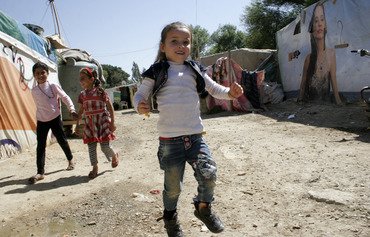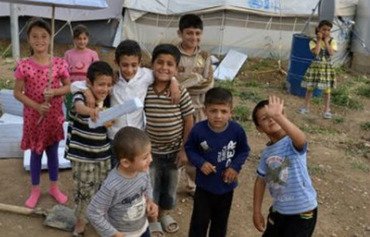A number of Syrian refugees told Al-Mashareq they have had trouble enrolling their children in Lebanese public schools this year.
Schools opened for registration in early October and will continue to enroll students through mid-November.
The main issue is that morning shift seats are not available for Syrian students this year and afternoon shift seats are limited, due to the high number of registering students.
As a result, some parents have been forced to register their children at schools far from their homes.
Another problem is that schools, unaware of the policy set for refugee students, are requesting identification documents some refugees simply do not have.
This was the case with Laila Khalil Bayazid of Aleppo and Aisha al-Jassim of al-Ajajiyah, in the vicinity of al-Raqa.
"I have been trying to re-register my children Mohammed, 10, and Remas, 7, at the Mazraat Yachouh elementary school, but to no avail," said Bayazid, who now lives in Mazraat Yachouh, al-Metn region.
"So I went to the Antelias public school, only to be asked for documents I do not have," she told Al-Mashareq.
Al-Jassim, who has lived in the Bekaa Valley town of Bar Elias since her arrival in late 2016, has faced similar challenges.
"I could not register my three children last year, and when I went this year to register them in the town's public school they asked me for documents that are not available," she told Al-Mashareq. "I do not know what to do."
Addressing problems
The UN High Commissioner for Refugees (UNHCR) has been monitoring the difficulties Syrian refugees are facing in registering their children in school, said Elena Cepera, the UNHCR official in charge of the Education Unit.
To address problems and help refugees enroll their children in school, UNHCR and its partner organisations set up a hotline parents can call for assistance: 0159300.
"Most of the problems Syrian refugees are facing are related to the unavailability of seats for their children at the schools they chose and having to find other schools that could be quite distant from their homes," Cepera told Al-Mashareq.
"There also is the problem related to the lack of information and misunderstanding by school administrations and students' parents of the circulars issued by the Ministry of Education regarding registration and admission," she said.
These problems are solvable, Cepera stressed, pointing to the "School Heroes" campaign, launched on August 31st.
The Ministry of Education and Higher Education campaign, conducted in partnership with UNHCR and other international organisations, encourages Syrian refugees and Lebanese nationals to return to school.
"We aim to register 220,000 of them in the 2017-2018 school year, an increase of 25,000 students from last year's total of 196,000," she said. "The ministry opened more schools for the afternoon shift to accommodate as many of them as possible."
Awareness campaigns
UNICEF also has been looking into the problems Syrian refugees are facing in registering their children in schools.
"We received complaints through the hotline, and most of them are related to their inability to register their children in particular schools," UNICEF media official Salam Abdul-Moneim al-Janabi told Al-Mashareq.
"We discovered after follow ups that some schools have exceeded their capacity of registered students," he said.
Another problem is that some public schools did not receive the Ministry of Education and Higher Education circular directing them to facilitate the registration of Syrian students, he added.
Civil society organisations working with UNICEF have been helping to resolve these problems, al-Janabi said, adding that registration-related problems are being referred to the ministry, "which is following up on them as required".
UNICEF staff and volunteers also are conducting field visits, especially in areas with high registration levels, to show refugees how register their children and to distribute leaflets containing lists of the required documents, he said.
To encourage school attendance among the refugee population, al-Janabi said, the ministry "limited the number of documents required for registration".
Only two documents are required, he said. "The first is a certificate that proves their age and the second a report on their health status."
This was not clearly conveyed to the schools, however, "which created a problem that requires all stakeholders, including ministries, organisations and associations to intervene", he said.
UNICEF also is compiling a list of school-age children waiting to be enrolled.
These waiting lists "are almost ready", he said. "We will submit them to the ministry to open more afternoon shifts, or as needed to provide an education to as many Syrian students as possible."
Adding afternoon shifts
The Ministry of Education and Higher Education has been working to solve the problems Syrian refugees are encountering in registering for school, said Sonia Khoury, director of the ministry's Comprehensive Education Programme.
"We are trying to accommodate as many of them as possible in afternoon shifts, because the morning shifts are full," she told Al-Mashareq.
Khoury said one problem is that "some parents [insist] on registering their children in morning shifts, while schools can no longer absorb even Lebanese students".
To resolve this problem, the ministry opened afternoon shifts at a further 51 schools to Syrian refugees, she said, "raising the number of public schools that are providing them with education to 364 schools throughout Lebanon".
"The Ministry of Education cannot provide an education to them in the morning because the contributions provided by international organisations and donors are insufficient to cover the actual cost of their education," Khoury said.
The donations "are sufficient to cover the cost of afternoon shifts, while the ministry contributes by putting its school buildings and equipment at their disposal", she said.

![Syrian students await the start of the afternoon shift at Mazraat Yachouh elementary school on October. They are among the few who were able to secure seats in this school this year. [Nohad Topalian/Al-Mashareq]](/cnmi_am/images/2017/10/27/10071-Lebanon-Syrian-students-600_384.jpg)







I have two children at Bteghrine public school. My older son has been at that school for three years, attending the pre-noon classes. This is the fourth year for him at school, but he principal refused to enroll him at school. And my younger son has been at school for one year, and this is his second year. Yet, I couldn’t have them enrolled at Bteghrine public school. Please take note that the school principal refused to have the Syrian students enrolled, except for four or five who were accepted based on support and favourtism.
Reply2 Comment(s)
I reside in Bikfaya and I had my children enrolled in Dbayeh because Bikfaya schools refused to register my children. Unfortunately, no driver agreed to take them to school because of the long distance. Therefore, I have stopped my children from going to school. Please I want a solution for this problem.
Reply2 Comment(s)